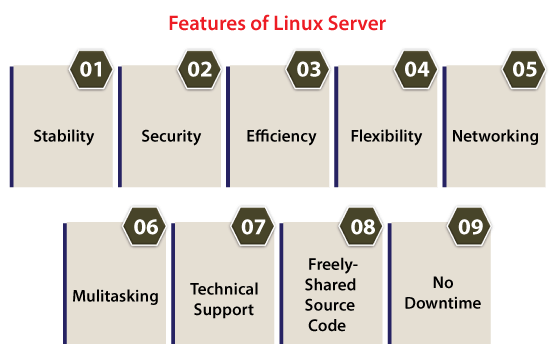Linux Server Introduction
Linux server is a type of server created on the Linux open-source OS. It facilitates enterprises a low-cost option to deliver services, apps, and content to their clients. Due to Linux is an open-source distribution, so the users also gain profit through a strong community of advocates and resources.
Linux server can be defined as the Linux operating system is very end variant that is the blood for handling intense storage and practical requirements of larger enterprises and their software. These servers are extensively used today and examined amongst the most famous because of their flexibility, security, and stability.
Another advantage of using Linux on closed-source software such as Windows is that the former is completely open-source. It helps keeps maintenance and set up costs low and several proprietary versions of the Linux operating system (like Red Hat, Ubuntu, CentOS, and Debian) provide users sufficient flexibility for maintenance, operation, and set up their servers.
Linux servers additionally are normally lighter for running on cloud servers and physical servers because they do not need any graphical interface. Most of the versions of Linux are completely command-line based unlike Windows, creating a lightweight result that prefers optimized and functionality on ease of use.
The Linux server we choose should facilitate security certifications and technologies and manage enhancements to encounter intrusions, secure our data, and match with regulatory compliance for a particular OS vendor or open-source project.
It should:
- Get continuous susceptibility security updates through a particular OS vendor or upstream community itself, which delivers and remedies each critical problem by upcoming business day for minimizing business impact if possible.
- Automate security configuration remediation and regulatory compliance around our system and in the containers along with image scanning such as OpenSCAP that remediates and checks against configuration security baselines and vulnerability, including against DISA STIG, National Checklist Program content for PCI-DSS, and more. It should additionally scale-out and centralize configuration remediation around our whole hybrid environment.
- Provide resources with security with the use of integrated control benefits like mandatory access controls (MAC), centralized identity management, Security-Enhanced Linux (SELinux) over a foundation called Common Criteria and FIPS 140-2-certified.
The Linux server should facilitate flexible integration and platform manageability with automation infrastructure and legacy management. It will save the time of IT staff and decrease unplanned downtime than a non-paid Linux infrastructure.
It should:
- Resolve technical problems before they affect business operations with the use of predictive analytics tools for automating remediation and identification of anomalies and the root causes.
- Simplify environment updates along with in-place upgrades that reduce the hassle of application rebuilds and machine migrations.
- Automate compliance and consistency around heterogeneous more than one environment and decrease scripting rework using system roles with native configuration management tools such as Puppet, Salt, Chef, Ansible, and others.
- Manage single system through web interface (easy-to-use) that contains services, containers, networking, storage, and more.
- Speed image deployment, building, and patch management around the data centre using built-in abilities and refine system life cycle management enhanced patching, provisioning, and more.
Features of Linux server
Some of the advantages of Linux servers are below:

- Stability: There is no requirement for periodic reboots for maintaining levels of efficiency. If correctly configured, Linux systems can normally operate until the system shut down or hardware failure.
- Security: Linux facilities top-notch security. Versatile file access as well as efficient firewalls permission systems ignores viruses or unwanted access.
- Efficiency: Linux provides consistent great performance on servers and networks. It contains the capability for managing huge parallel connections and user volumes as well.
- Flexibility: Because Linux is an open-source distribution, so the source code is available readily to every user. All the users could use it as per their needs.
- Networking: It offers exceptional networking benefits. It is usable to various apps in inclusion to being protected.
- Multitasking: Multitasking is the capability to execute more than one task or program simultaneously. It is supported by Linux.
- Technical support: Linux provides a few great technical support exist. It is being customized by several commercial distributors, consultants, and an active community of developers as well.
- Freely-shared source code: So many developers are reviewing and have reviewed the Linux source code. So, the efficiency is increasing which causes enhanced performance, improved security, and elimination of bugs.
- No downtime: Every update is virtually used without keeping the system offline. Rarely, Linux-run servers need a reboot for correcting errors or completing updates. It means no downtime practically.
|

 For Videos Join Our Youtube Channel: Join Now
For Videos Join Our Youtube Channel: Join Now










